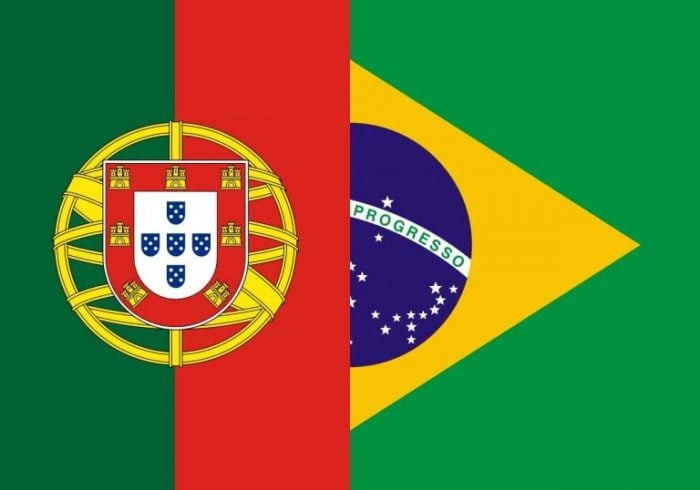Brazilian vs Portugal Portuguese: Are They Really That Different?
Wonderful beaches, friendly people, exquisite food… these are just some of the things that Brazil and Portugal have in common. But what about the language? Well, though the Portuguese and the Brazilians speak the same tongue, many would say this is not something they have in common!
The pronunciation, spelling, vocabulary, and grammar are all different between these two varieties. But, are they really that dissimilar? Find out in this comparison of Brazilian vs Portugal Portuguese.

Image via Wikimedia
Explore our Online Free Trial Portuguese Classes with a qualified native speaker!
Brazilian Portuguese vs European Portuguese: Pronunciation
Brazilian Portuguese has a unique rhythm that makes it stand out as soon as you hear it. It is very musical and quite clear. European Portuguese, in contrast, is rather fast. Actually, many learners claim that this is one of the reasons why Brazilian Portuguese is much easier to follow.
Besides, the vowels of the South American variety are longer and wider. In Portugal Portuguese, the vowels are a bit harsher, and sometimes even dropped entirely. This is very noticeable at the end of words, like in the case of como (like).
In terms of consonants, the first difference that stands out as soon as you hear the two accents together is the pronunciation of the letters “s” and “z” in final position. While in Brazilian Portuguese they sound like a normal “s”, in European Portuguese they are pronounced as a “sh”. You can hear this difference clearly in the word rapaz (boy).
Another aspect that will stand out almost immediately when comparing Brazilian vs Portugal Portuguese is the pronunciation of the syllables “te” and “de”. In Brazil, they are pronounced “chi” as in “cheese”, and “ji” as in “genius”. In Portugal, these sounds are “t” as in “tea”, and “d” as in “dim”. You can hear this difference in presidente (president) and desde (since).
Brazilian vs Portugal Portuguese: Spelling
In 1990, the Portuguese and the Brazilian governments aimed at ironing out the differences in spelling between the two varieties. Though this attempt was largely successful, there are some people who, still today, insist on writing words in the same way as before.
This means that, depending on the writer’s stance regarding this agreement, you may find a few minor differences in many common words. Most of them refer to the addition of consonants in the middle of a word, like “receção” and “facto” in Portugal Portuguese vs. “recepção” and “fato” in Brazilian Portuguese.
Brazilian Portuguese vs European Portuguese: Vocabulary
This is an area in which there are some major differences between the two varieties. Though in most cases the meaning of the word is intelligible in the other variety, it may cause serious misunderstandings sometimes. For example, while in European Portuguese, rapariga is a very innocent word, it means “female prostitute” in Brazil.
| Brazilian Portuguese | European Portuguese | English |
|---|---|---|
| Café da manhã | Pequeno almoço | Breakfast |
| Legal | Fixe/giro | Cool |
| Lugar | Sítio | Place |
| Celular | Telemóvel | Cellphone |
| Menina | Rapariga | Girl |
| Ônibus | Autocarro | Bus |
| Trem | Comboio | Train |
| Tela de computador | Ecrã | Screen |
| Banheiro | Casa de banho | Bathroom |
| Suco | Sumo | Juice |
| Camisola | Camisa de noite | Nightgown |
| Geladeira | Frigorífico | Refrigerator |
| Fila | Bicha | Line |
| Grampeador | Agrafador | Stapler |
| Pedestre | Peão | Pedestrian |
| Ponto de ônibus | Paragem de autocarro | Bus stop |
| Sorvete | Gelado | Ice cream |
| Xícara | Chávena | Cup |
| Calcinha | Cuecas | Panties |
| Presunto | Fiambre | Cured ham |
| Academia | Ginásio | Gym |
This list is by no means exhaustive, but it will give you a good idea of what you can expect. As you can see, most of the differences occur in very common words. So, if you already speak Brazilian Portuguese and plan to visit Portugal, or the other way around, you would do well in memorizing these differences.
Brazilian vs Portugal Portuguese: Grammar
Personal Pronouns
In terms of grammar, the most outstanding difference when comparing Brazilian vs Portugal Portuguese is the use of the second person singular pronoun.
To say “you”, Brazilians use the word você. In Portugal, this is done with the word tu. Of course, this will change the verb conjugations for the second person. So, while in the South American variety you would say você corre for “you run”, the Portuguese would say tu corres.
This is not to say that você does not exist in Portugal. The difference is that it is used only in certain formal situations. It is more formal than tu, but not as formal as o senhor/a senhora. You could use this pronoun, for example, to talk to a much older person you are familiar with.
Object Pronouns
While it is common to place object pronouns before verbs in Brazilian Portuguese, in the European variety this is done after.
- Tu o bebes “You drink it” (Brazil)
- Tu bebe-lo “You drink it” (Portugal)
Tenses
Another common difference you will notice almost immediately is the use of gerunds. While Brazilians use them practically like we do in English, the Portuguese avoid using the gerund as much as possible. Instead, they use the word a followed by the verb in the infinitive. So, it would be:
- Estou comendo “I’m eating” (Brazil)
- Estou a comer “I’m eating” (Portugal)
This will probably come as a shock to you if you already speak Brazilian Portuguese and have had no contact whatsoever with the European variety, but you will get used to this pretty quickly.
As you can see, the differences between the two varieties are many, especially in terms of pronunciation and grammar. Still, they are both intelligible between them. So, if you have to choose between Brazilian vs Portugal Portuguese and are worried that you may need to use the other one later on, do not think too much about it. Just start with the variety you will need first and then, with a few adaptations, you will be able to start speaking the other variety fast.

If you want to take your Portuguese to a whole new level and learn about all the nuances of each dialect, who better to ask than a trained native speaker? You can sign up for our Online Portuguese Courses with experienced native-speaking tutors who can prepare a syllabus tailored to your needs and abilities.
And if you would like to take part in a multicultural class with learners from all over the world who are at your same level of proficiency and learn at a fraction of the cost, explore our Open Group Portuguese Courses.
Explore our Online Free Trial Portuguese Classes with a qualified native speaker!
Editor’s note: Article updated on August 3, 2021.
